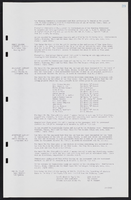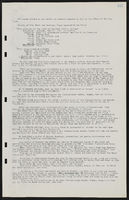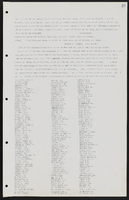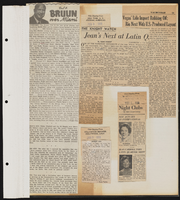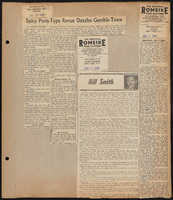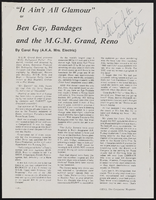Search the Special Collections and Archives Portal
Search Results
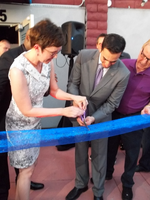
Heidi Swank, Ruben Kihuen, and David Parks attend the Club Metro bar grand opening, Las Vegas, Nevada: digital image
Date
Archival Collection
Description
Image
Buford, Eugene
Eugene Buford came to Las Vegas, Nevada from Birmingham, Alabama, when he was two years old with his mother and grandmother. He held a variety of jobs, including washing dishes at the Last Frontier and delivering ice to casinos like the Flamingo and the Stardust, and ultimately retired after thirty-six years with the Post Office. Buford's great grandmother, Mary Nettles, was instrumental in the formation and growth of the NAACP chapter in Las Vegas, and he recalls meetings in her house and his own role as president of the Junior League NAACP.
Person
Sin Sity Sisters of Perpetual Indulgence Records
Identifier
Abstract
The Sin Sity Sisters of Perpetual Indulgence Records (2005-2018) contain organizational records of the Sin Sity Sisters of Perpetual Indulgence, an LGBTQIA+ charity and advocacy organization in Las Vegas, Nevada. The records include agendas and meeting minutes, financial records, press material, awards, and certificates of appreciation for the organization. Also included are financial records for the organization's annual Red Dress charity fundraiser and the Sisters AIDS Drug Assistance Program (SADAP), the grant fund that provides financial assistance to AIDS/HIV patients.
Archival Collection
Claytee D. White oral history interview
Identifier
Abstract
Oral history interview with Claytee D. White conducted by Stefani Evans on November 2, 2023 for the African Americans in Las Vegas: a Collaborative Oral History Project. In this interview, Claytee D. White, founding directory of the Oral History Research Center at UNLV Libraries, celebrates the twentieth anniversary of the OHRC by contributing her oral history to the collection.
She begins by explaining how the system of sharecropping worked in her family near rural Ahoskie, North Carolina, and she talks about the field work involved in raising cotton, tobacco, corn, and peanuts. The fifth of eight children and the first daughter, she shares memories of going into town with her mother, of admiring her women teachers, and of attending North Carolina Central College (now University) for two years before moving to Washington, D.C., and working for the telephone company.
After recalling her two years in D.C. and 22 years in Los Angeles, California, she describes "running away" to Las Vegas, Nevada in the early 1990s. Here, at the History department at UNLV, she recalls learning to conduct oral histories. White shares memories of her first interviews with Hazel and Jimmy Gay and Lucille Bryant. She talks of matriculating to the College of William and Mary for her PhD and of returning to Bertie County to live with her mother and administer the office of The Shaw University Center for Alternative Programs in Education (CAPE). She describes how she was offered the position of OHRC founding director, why it matters that she was an "opportunity hire," and how it feels to be the only Black person in a room.
Archival Collection

